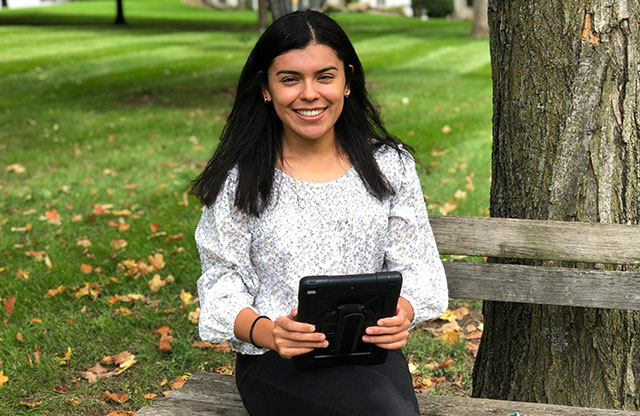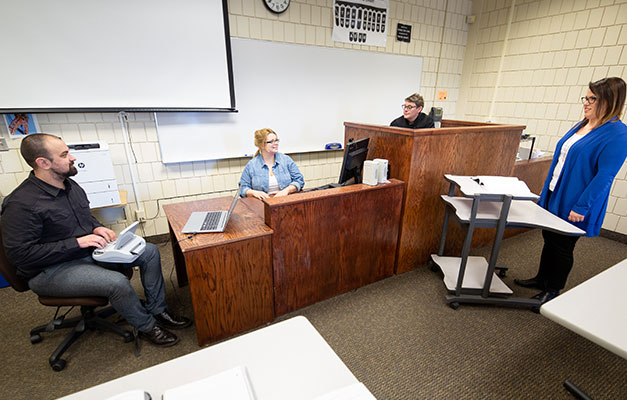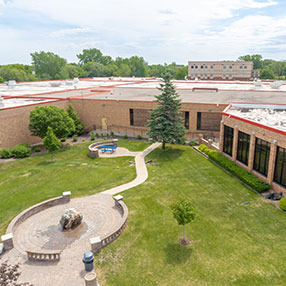Judicial Reporters, also known as court reporters, play a crucial role in the legal process using cutting-edge technology and phonetic language skills to bring the spoken word to text accurately, in real-time.
Anoka Technical College's Judicial Reporting program prepares students to work as official reporters employed by the state or freelance reporters who typically work as independent contractors with law offices.
Why Study Judicial Reporting at Anoka Tech?

Only program in Minnesota

Courses delivered in person and online

Versatile career pathways
Industry & Career Outlook
Potential Jobs:
- Court Reporter
- Court Stenographer
- Freelance Reporting/Deposition Reporter
Salary Information:
Median Wage: $33.36 per hour
Top Earners: $40.33 per hour
Information provided is for Minnesota. See current data at mn.gov/deed.
Hear from Our Students
Other Program Info
All curricula were created to meet or exceed the National Court Reporters Association’s (NCRA) standards set out by the Council on Approved Student Education (CASE).
The Judicial Reporting/Broadcast Captioning/CART programs are approved by NCRA Upon graduation, students will be ready to take the NCRA's Registered Professional Reporter (RPR) certification exam. The RPR exam is offered twice per year April and November.
The Judicial Reporting program degree and related certificates can all be completed in person or online.
Take a virtual tour to get an idea of what it's like to be an Judicial Reporting student at Anoka Tech.
The Anoka Technical College Judicial Reporting program offers awards in two related certificates:
CART (Communication Access Realtime Translation) and Broadcast Captioning
Info for Current Students
All Realtime Reporting courses must be completed with a B or higher. All other courses required for this program must be completed with a C or higher. In addition, students shall pass three five-minute speed tests with 97% accuracy at the following speeds: 225 wpm testimony (two-voice), 200 wpm jury charage, and 180 wpm literary.
The student shall successfully complete an internship with no less than 40 hours of
verified actual writing time.
Successful completion of the Judicial Reporting AAS degree program at Anoka Technical College will meet the requirements for certification by the National Court Reporters Association’s (NCRA). Certification by National Court Reporters Association’s (NCRA) is required by Minnesota as well as by some states to acquire a state license to practice the profession of Judicial Reporting or for employment as a certified/licensed Judicial Reporter.
For those states where a determination cannot be made they have additional exams or requirements specific to their state for which we cannot determine if our program would prepare students to receive licensure in those states. See link below for state certification requirements.
State Certification Requirements
In Minnesota, stenographic court reporters must meet the following minimum qualifications:
- Graduation from high school or equivalent; and
- Graduation from a court reporting school approved by the National Court Reporters Association (NCRA) within the past two years; or
- Compliance with one of the following:
a. Received a Registered Professional Reporter (RPR) designation from the NCRA; or
b. Received an equivalent certification from another state or territory of the United States, or professional court reporter association; oR
c. Have been practicing proficiently as a professional stenographic reporter for the past two (2) years and within one (1) month of hire, accurately take a minimum of 20 minutes of court proceedings alongside a stenographic court reporter who has an RPR designation or certification as provided in clauses (a) or (b) , and then produce a transcript with 95% accuracy as described in (d) below; or
d. Obtain RPR designation from the NCRA within two years of hire. Pending receipt of the RPR designation, must, within one (1) month of hire, accurately take a minimum of 20 minutes of court proceedings alongside a stenographic court reporter who has an RPR designation or certification as provided in clauses (a) or (b), and then produce a transcript. The participating RPR certified stenographer will determine that Ninety-five (95) percent accuracy is achieved to successfully complete this requirement.
Please contact Jennifer Sati with questions.
In the News

Judicial Reporting student training for more than a job, it’s a dream career

Judicial Reporting helps student out of rut to achieve dream career
Start Dates:
Fall semester: August
Spring semester: January
Summer semester: May (mandatory)



